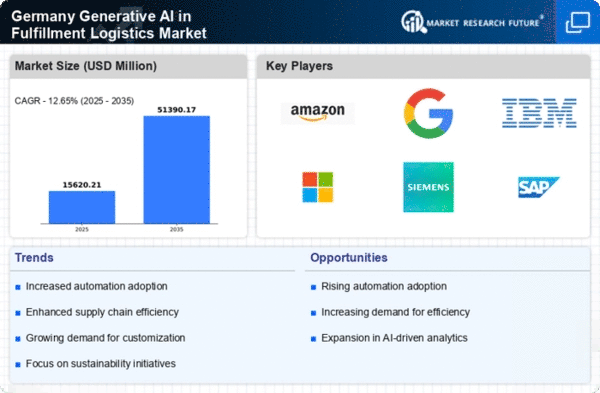Rising Demand for Customization
The generative ai-in-fulfillment-logistics market is experiencing a notable increase in demand for customized logistics solutions. As consumers in Germany seek personalized products and services, logistics providers are compelled to adapt their operations accordingly. This shift necessitates the integration of generative AI technologies to enhance flexibility and responsiveness in fulfillment processes. According to recent data, approximately 70% of consumers express a preference for tailored experiences, prompting logistics companies to invest in AI-driven systems that can efficiently manage diverse product specifications. The ability to quickly generate and adapt logistics plans based on individual customer needs is becoming a critical competitive advantage in the market.
Enhanced Supply Chain Resilience
The need for enhanced supply chain resilience is becoming increasingly apparent in the generative ai-in-fulfillment-logistics market. Companies in Germany are recognizing the importance of building robust logistics networks capable of withstanding disruptions. Generative AI technologies can play a pivotal role in this regard by providing predictive insights and enabling proactive risk management. By analyzing historical data and current trends, AI systems can forecast potential disruptions and suggest alternative logistics strategies. This capability is particularly valuable in a dynamic market environment, where agility and adaptability are essential for maintaining service continuity and customer satisfaction.
Regulatory Compliance and Standards
Regulatory compliance is a crucial driver for the generative ai-in-fulfillment-logistics market in Germany. As the logistics sector faces increasing scrutiny regarding data protection and environmental standards, companies are compelled to adopt AI solutions that ensure compliance with these regulations. Generative AI can assist in automating compliance processes, thereby reducing the risk of penalties and enhancing operational transparency. Furthermore, adherence to regulations can improve customer trust and brand reputation, which are vital in a competitive market. The emphasis on compliance is likely to drive investments in AI technologies that facilitate adherence to both local and EU-wide regulations.
Integration of IoT and AI Technologies
The convergence of Internet of Things (IoT) and generative AI technologies is significantly influencing the generative ai-in-fulfillment-logistics market. In Germany, the integration of IoT devices enables real-time data collection and monitoring, which, when combined with generative AI, enhances decision-making capabilities. This synergy allows logistics providers to predict demand fluctuations and optimize inventory management effectively. As a result, companies can reduce waste and improve service levels. The market is witnessing a growing trend where logistics firms invest in IoT-enabled AI systems, with projections suggesting that this integration could lead to a 25% improvement in operational efficiency.
Cost Efficiency through AI Optimization
Cost efficiency remains a pivotal driver in the generative ai-in-fulfillment-logistics market. Companies in Germany are increasingly leveraging AI technologies to optimize their supply chain operations, thereby reducing operational costs. By employing generative AI algorithms, logistics providers can analyze vast datasets to identify inefficiencies and streamline processes. Reports indicate that businesses utilizing AI-driven logistics solutions have achieved cost reductions of up to 30%. This financial incentive encourages more companies to adopt generative AI, as it not only enhances profitability but also allows for reinvestment in further technological advancements.
















